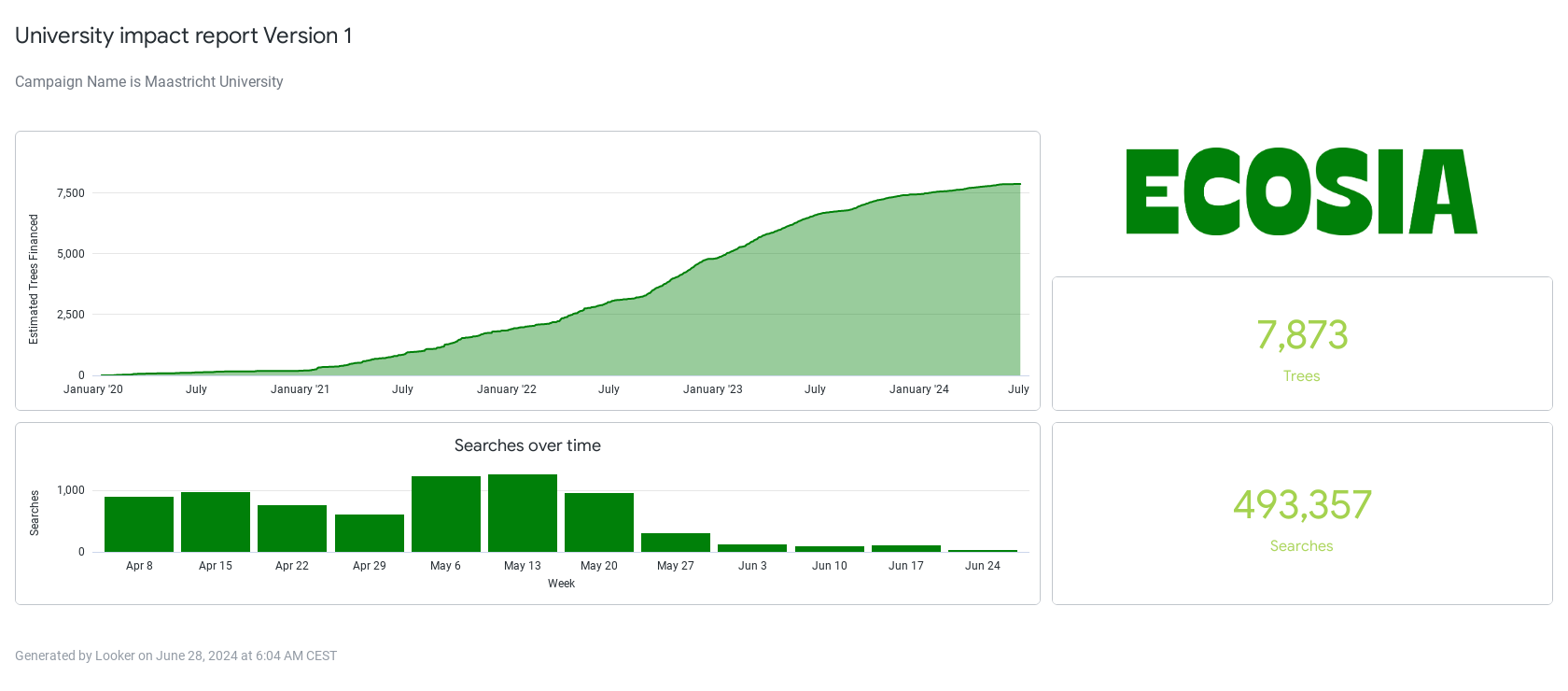Sustainable ICT
‘Greening of and greening by IT’
For the next coming years, the motto for greening UM’s ICT-facilities is: ‘Greening of and greening by IT’. 'Greening by IT' means using IT as an instrument to make the organizational processes sustainable. Take for example the increased utilization of IT in education, like digital tests, but also enabling remote education, virtualizing the workplace, home office, video conferencing, unified communications and further implementation of smart-building principles, like employing Internet of Things (IOT). In the past three years, there has been an acceleration in applying IT for primary and supporting processes. In the coming time, UM will continue to further develop IT-solutions.
'Greening of IT' involves reducing the negative sustainability impact of ICT hardware throughout the chain, from production and use to waste disposal. Through UM's procurement policy, suppliers are expected to meet the minimum requirements for sustainable procurement (PIANOo). By defining and applying award criteria in the area of corporate social responsibility, we select suppliers who make additional efforts in sustainability in terms of CO2 emissions, environment, circularity and well-being & health.
Below you’ll find some examples of developments of our sustainable ICT related services:
Energy Crisis
In the context of the energy crisis, our service center ICTS has taken additional measures to save energy. To this end, the equipment present in the server rooms at UM locations has been critically examined. Equipment that is not in use has been switched off and immediately disconnected from the power supply to prevent standby power consumption. We are also rearranging our server environments so that systems are switched on and off when necessary. As a standard, equipment is now on standby and is automatically started up when demand increases. Furthermore, network components are connected more efficiently with a view to saving costs. Consider, for example, combining more connections per network component so that another component can be switched off. Furthermore, the cooling temperature in the server rooms is increased so that less cooling is needed.
Surf the internet with Ecosia
From 2021 the sustainable search engine Ecosia has been set as a standard on all Student Desktops (SDT) in all library locations. Ecosia is also available for students who use Student Desktop Anywhere for external access to the SDT-facilities on and off campus. Ecosia is the search engine that plants trees to help fight climate change. For an elaborate explanation on this initiative, read the complete article on the Library Wall. Below you'll find the two monthly Ecosia report for UM.


Printing and paper
In 2020 a new tender contract was set up for the printing services. The new supplier offered complete climate neutral printing services. The equipment has a minimal energy use; the standard multifunctionals have a TEC-value (conform Energy Star 3.0) of 1.8 kWh. This led to an energy reduction of 30% in relation to the previous printing equipment.
The copy and printing paper at UM is labeled conform FSC and EU Ecolabel. All paper is ECF (Elemental Chlorine Free), that means bleached without chlorine gas. It’s been CO₂ neutral manufactured, the energy needed for manufacturing comes from recovered energy from pulp production. The inevitable emissions from transport are compensated by the supplier by certified CO₂ certificates.
To be able to print completely climate neutral, not only the paper, but also the transport of the paper has to be climate neutral. For this reason, our service provider has bought an electric car in 2021, which is used for its services for UM. This car is used to bring paper and toner to UM locations. Moreover, this car is also used when small malfunctions of printers need to be fixed, like jammed paper. The car is charged at UM with 100% green electricity. This way, UM is one step closer to climate neutral business operations.
Paperless working
Within UM there are several initiatives to facilitate and implement paperless working. Since 2018 invoices can only be submitted digitally via the UM portal. For paperless meetings staff can use iBabs.
Data center
UM has moved a part of its server capacity to the former TV tower Daalhof, a concrete transmission tower from 1967. The data center is equipped with an ultra-efficient cooling system that is energized by 100% Dutch wind energy. Currently we are investigating whether even more of the internal server capacity can be moved to more efficient external data centers.
Virtualisation
Since 2010, UM has taken important steps to reduce the explosive demand for server platforms and subsequent energy use by using virtualisation. All primary organization processes work on virtualised server and storage platforms, by which the environmental footprint is limited as much as possible.
Smart Building
Almost all of UM’s buildings are connected to the building management system, so installations can be monitored and managed remotely. Developments in internet and sensor technology make new kind of applications possible. Since 2020, weather predictions are taken into account in controlling the indoor climate. Early anticipation of weather changes benefits the comfort and energy efficiency of the building.
In the renovation and new development project Tapijn, smart technology has been used conform the sustainability guidelines BREEAM and WELL Building. In the forthcoming years, UM’s scientists will research the effects on wellbeing of the building’s users. The research results and experiences are used as input for the future vision of UM’s realty.
In the latest tender for LED lighting we selected a system that has additional capabilities to further implement Smart Building Technology, such as controlling heating, cooling and ventilation systems based on presence.
E-waste
Electronic waste is collected separately and processed by a company that is certified by WEEELABEX. For returning old equipment, employees can submit an online request via Facility Self Service. AthenaDesktop computer equipment can be returned through the ICTS Self-Service Portal. If you want to dispose of used batteries, there are blue boxes available near the reception desks or entrances of UM buildings.